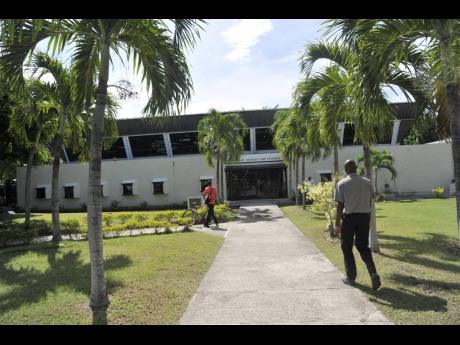COURSE CRISIS
Law school ethics exam failure rate sparks outcry; students call for fee waivers, reviews
Dozens of year two students at the Norman Manley Law School (NMLS) are crying foul following the results received for the institution’s course in ethics for the legal profession that show an “alarming” number of failures.
Of the 125 students listed to sit supplemental exams for courses failed, 113 did not achieve the passing grade for the law school’s Ethics, Rights & Obligation of the Legal Profession course administered in May.
It is not clear the overall number of students who sat the course and the exact figure for those who failed because students who fail three or more courses are not a part of the published supplemental list.
Students who spoke with The Gleaner but requested anonymity argued that there is no transparency in how the review process or matter is being handled.
Additionally, they say a go-through of papers with course tutors are at the tutors’ discretion and is not mandatory.
“They don’t have our interest at heart. How can you tell students that you are not assured a go-through to ascertain where you went wrong and how you can correct it? It is unfair and we are paying millions of dollars,” a student, who had failed the course for a third time, told The Gleaner on Monday.
“When you fail, your school fee is doubled … . If it’s your first time in first year or second year, you pay somewhere between $1.3 million and $1.4 million. If you fail at that point, once you re-enrol to sit back that same year you failed, you are now going to pay double whatever that is. So, $2.6 million or thereabout,” the student added.
COST OF RESIT
The student explained that the cost to resit a single course is approximately $150,000.
In a July 11 letter to NMLS Principal Carol Aina, the school’s students’ association said 75 per cent of year two students who responded to its enquires about the course indicated that the method of delivery may have accounted for the statistic.
The students’ association said there is no clarity on what is required as it relates to the answers to examination questions and it said this was persistent throughout the academic year.
Additionally, it said lectures, recorded or otherwise, which may have better assisted students were lacking.
The students’ association wants, among other things, leniency to be extended to students who have failed three courses, including the ethics course, to sit supplemental examinations.
It is also asking for communication of key statistics from the law school to include the percentage of year two cohort who failed the ethics course.
The facilitation of one or more workshops by the director of the ethics course has also been proposed. The students’ association said this should indicate how to approach the pending supplemental exam.
It has also requested a detailed review of the 2024 final examination for the course director to give feedback on the key issues noted in the exam scripts, along with the ideal content and form of the answers.
Further, it wants a waiver of the $7,500 fee for supplemental exams, the appointment of an independent marker to assess the exams, and a two-week extension on the time given for preparation for supplemental exams.
AVENUE FOR RECOURSE
But in an emailed response to The Gleaner on Tuesday, the principal said students are aware of the avenue for recourse.
“The school’s regulations provide a process for students who are dissatisfied with the outcome of an assessment or examination to pursue. This is available to all students, and I would encourage students to follow these regulations to address their concerns with any grades awarded,” Aina said.
She declined to comment on whether the issue is being reviewed by the law school, whether the course is unique to NMLS, and whether the current failure rate is an anomaly.
Aina also declined to comment on what percentage of students who sat the exam were successful.
In a note to students seen by The Gleaner, Aina acknowledged a “significant number of failures” for the ethics course as well as the Landlord and Tenant course.
She said the law school’s examination committee, as a first step, will do an analysis of the results and conduct an independent review of scripts awarded D grades.
Aina said consistent with the school’s regulations, the review will be conducted by two independent markers.
However, the principal noted that the decision of the examination committee is independent of the process of review, available to eligible students.
Under the established guidelines and regulations, students who wish to have their grades reviewed are required to make an application, having carefully followed the steps outlined.
Some students have called the ordeal a “money grab” by the school, noting that some of their peers had sat the exam for a third time unsuccessfully and would be making their fourth attempt at the supplemental in August.
“It’s just really alarming that this course is holding back a lot of students and embarrassing them. They go on job interviews and then end up having to decline offers because they have failed this course. It’s been a really rough time and some students believe that the school is milking them for more money. That’s the general consensus,” a second student who failed told The Gleaner.
One student, who sat and passed the exam on his third attempt, said one of the challenges students face is that there is no clear metric for the course.
“There is no communication between the tutors and course directors in terms of what is expected for the exam,” the student said.
Social commentator and attorney-at-law Kenyatta Powell noted that ethics is an “extremely important” aspect of the legal profession.
He said this is to the extent that lawyers are often called upon to handle very important aspects of people’s lives.
He said this often includes the difference between freedom and having someone’s liberty curtailed.
“Those are very weighty responsibilities and so if you are not operating by a clear ethical code, where there are bright lines between right and wrong and guidelines as to what we are allowed to do and we are not allowed to do and sometimes crucially what we ought to do, then the possibility of doing serious harm to people multiplies,” he said.
While offering no comment on the current issue, declaring that he is not fully briefed on the details, he urged the law school to be “as consultative as much as possible”.
Powell said students must be engaged to ascertain their concerns, assess whether they are legitimate, and find ways to address them.
He said nothing in law lends itself to being easily understood, but said successfully completing law school requires application of self and engaging deeply with course materials and readings.


